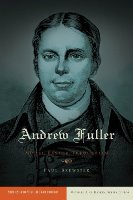Reviewed by Andrew Spencer
Paul Brewster earned his Ph.D. in Theological Studies from Southeastern Baptist Theological Seminary and is currently serving as Senior Pastor of Ryker’s Ridge Baptist Church in Madison, Indiana. Andrew Fuller: Model Pastor Theologian is a revision of Brewster’s PhD dissertation. His thesis is that Andrew Fuller is a model pastor-theologian because he effectively combined local church ministry with a broadly evangelical ministry of theological writing (6). Brewster’s secondary purpose in writing is to highlight some of the dangers of our contemporary theological milieu among evangelical pastors and to point toward a real, historical example of someone who was both pastor and theologian to great effect.
Overview
Brewster establishes his thesis in five chapters. The first chapter explains the need for pastor-theologians in the contemporary setting: local churches are, to their detriment, often theologically anemic. Brewster cites the decline of doctrine among Baptists as a reason to study Fuller, in order to renew the category of pastor-theologian. Then, in order to provide context for the following discussion of Fuller’s ministry, he sketches out Fuller’s biography including his conversion, vocation, and family life.
The second chapter discusses Fuller’s theological method. Fuller believed in systems of theology, but those systems must always be subjected to the ultimate authority of Scripture. Fuller’s subordinated use of theological system was driven in part by his circumstances, but it also ran contrary to the theological currents of his day. Fuller was an occasional theologian; he attempted to honor theological systems, particularly the Calvinist system, but he focused his own efforts on the pressing theological questions of the day.
In the third chapter, Brewster analyzes Fuller’s position on soteriology, which was one of the most significant topics that Fuller engaged. Brewster helpfully details the soteriological climate of Fuller’s day – the ongoing battles between so-called High Calvinism, Arminianism, Socinianism, Universalism, and Sandemanianism – which is essential for understanding Fuller’s significant contribution to Baptist doctrine.
Chapter four details the means through which Fuller applied his theology to his ministerial practice, especially demonstrating the shift in Fuller’s preaching over his pastoral career. The book concludes with a brief fifth chapter that discusses some of the limitations of the study and points toward opportunities for further development of Fuller scholarship and integration of theology into the local church settings. Brewster also includes two appendices: reprints of Fuller’s confession of faith as presented to the church in Kettering and of an article on Calvinism written by Fuller for a theological dictionary. Both provide important background for Fuller’s theological perspective.
Contribution
This volume makes a significant contribution to evangelicalism for several reasons. First, the subject is timely: examining the life of a theologically-minded pastor is especially important when movements like the Emerging Church and post-modernism continue to erode the concept of truth and the place for truth in the local church. Brewster sets the stage for this discussion well in his introduction, invoking David Wells’ series on the state of evangelicalism and truth.
Second, Brewster contributes a helpful volume to the study of a Baptist theologian who was, until recently, historically obscure. Fuller scholarship is reviving in the early twentieth century after more than a century of slumber; as the resurgence of conservative theology in the SBC and the continued battle over inerrancy and soteriology grows, solid academic work on historically significant figures such as Fuller are important. In many ways the theological climate during Fuller’s life is analogous to the contemporary setting, making the study of Fuller especially rewarding.
Third, Brewster writes exceptionally well, thus enabling those uninitiated into the scholarly guild to have access to analysis of such a significant figure. Readable prose is an important of the value of this book, since the effectiveness of a pastor-theologian depends on his ability to understand and synthesize theology academically, but it is also vital that the pastor-theologian makes his theological output comprehensible to a broad audience, such that even a theological work is pastoral.
While this text does not fall into the category of hagiography, Brewster (and many of the other scholars researching the legacy of Fuller) could be more balanced by more fully examining the impact that Fuller’s ministry as a leading evangelical theologian and missionary fundraiser had on his work as a local pastor and husband. Brewster discusses both of these weaknesses in Fuller’s life briefly, but it would be beneficial for someone to do a thorough and careful analysis of the potential excesses in Fuller’s work. As much as Fuller can be an encouragement because of the level of excellence in his work and the significance of it in such a difficult time, the same group that benefits the analysis of his positive attributes can be helpful instructed through Fullers errors of excess and so perhaps avoid them.
Andrew Fuller: Model Pastor-Theologian is an excellent piece of scholarship and a good read. Brewster is effective at demonstrating his thesis and communicating it in a winsome manner. This volume would make a significant contribution to any pastor’s library, whatever his aspirations and abilities are for doing public theology.
Andrew J. Spencer is a PhD student studying Christian Ethics at Southeastern Baptist Theological Seminary in Wake Forest, NC.
Buy the books

ANDREW FULLER: MODEL PASTOR-THEOLOGIAN, by Paul Brewster